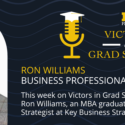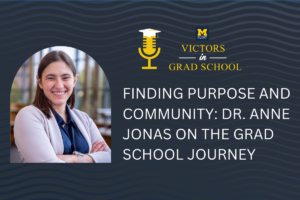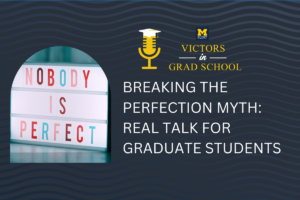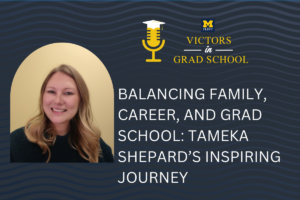Graduate school is a significant undertaking that requires dedication, commitment, and a clear focus on personal and professional goals. This week on the Victors in Grad School Podcast we have a compelling conversation with Ron Williams, a successful business professional who holds a Master of Business Administration (MBA) from the University of Michigan – Flint. Throughout the episode, Ron shares valuable insights into his decision to pursue higher education, and the journey through his MBA program. His experience provides a wealth of knowledge for anyone considering or currently navigating the challenges of graduate school.
Reasons for Pursuing Grad School
As Ron delves into the reasons behind his decision to continue his education and pursue an MBA, he highlights three primary motivations. First, he sought to increase his earning potential, recognizing the tangible benefits that advanced education can bring. Additionally, the convenience and location of the program played a significant role, showcasing the importance of considering practical factors in choosing a graduate program. Finally, Ron was driven by a desire to expand his knowledge beyond his accounting background, aiming to gain a holistic understanding of business management. These motivations reflect the multifaceted considerations individuals should weigh before embarking on a graduate education journey.
Choosing the Right Graduate Program
When faced with various MBA program options, Ron’s decision to attend the University of Michigan Flint was influenced by the institution’s reputation and credibility. He emphasized the significance of the program’s standing and the experiences of individuals who had gone through it. This highlights the importance of thoroughly researching and evaluating different programs to align with one’s career goals and expectations. It reinforces the idea that beyond the educational content, the reputation and credibility of the institution can significantly impact one’s educational experience and future career prospects.
Moving Towards Lifelong Learning
Ron’s decision to pursue a Ph.D. stemmed from his diverse experiences and a strong foundation in lifelong learning. His military background instilled discipline and a drive for continuous improvement, shaping his approach to education and professional development. Additionally, his pursuit of a Ph.D. in business anthropology reflects a keen focus on understanding the science behind business and leveraging insights to support small and middle-market enterprises. This showcases the value of leveraging one’s prior experiences and skills to carve a unique educational path that aligns with personal aspirations and long-term career goals.
Preparation for the Next Educational Chapter
Preparing for a Ph.D. involves seeking out mentorship and investing time in fundamental groundwork. Ron emphasizes the importance of finding mentors, both in academic and non-academic fields, as a critical part of professional development. Their guidance and insights can offer invaluable perspectives, aiding in personal growth and a broader understanding of complex subjects. Additionally, his dedication to reading recommended literature and seeking diversity in perspectives underscores the significance of embracing a well-rounded educational approach to enrich personal and professional growth.
Success in Graduate School
Reflecting on his MBA journey, Ron emphasizes the value of understanding material beyond the pursuit of grades. He highlights the importance of active listening, contextual understanding, and collaboration with peers as pivotal components of navigating a successful graduate school experience. His insights emphasize that success in higher education extends beyond academic achievements and requires a multifaceted approach that encompasses practical application and interpersonal learning from diverse perspectives.
Application of MBA Skills in Professional Endeavors
Ron’s experience demonstrates the tangible benefits of his MBA education in shaping his daily professional endeavors. Beyond theoretical knowledge, his MBA equipped him with the ability to actively listen and comprehend diverse viewpoints, essential skills for navigating the complexities of business and leadership. His ability to collaborate, understand stakeholder perspectives, and lead teams stands as a testament to the practical application of knowledge gained during his MBA journey.
Advice for Aspiring Graduate Students
Drawing from his own experiences, Ron offers valuable advice for aspiring graduate students. He emphasizes the significance of dedicating time to truly understand course material, not solely for the sake of grades, but for comprehensive comprehension. This advice underscores the importance of embracing knowledge for its intrinsic value and the role it plays in preparing individuals for the dynamic challenges they will encounter in their respective industries.
Ron Williams’ journey through the MBA program at the University of Michigan Flint offers a wealth of insights that can benefit individuals considering or currently navigating graduate school. His reflections on motivations, program selection, and the application of skills in professional settings provide a holistic view of the impact and importance of graduate education. As Ron moves forward in his pursuit of a Ph.D., his dedication to lifelong learning and the practical application of knowledge stand as exemplary lessons for anyone considering or already engaged in the challenging yet rewarding journey of graduate education.
This podcast is brought to you by The Office of Graduate Programs at the University of Michigan-Flint. If you’re still wondering about other things to consider when it comes to graduate school, you can also contact the Office of Graduate Programs at UM-Flint. We’re here to answer questions Monday – Friday from 8:00 a.m. to 5:00 p.m. EST. You can also find out more about the 50+ programs that the university has to offer here.
TRANSCRIPT
Dr. Christopher Lewis [00:00:01]:
Welcome to the Victor’s in Grad School, where we have conversations with students, alumni, and experts about what it takes to find success in graduate school.
Dr. Christopher Lewis [00:00:12]:
Welcome back to Victor’s in Grad School. I’m your host, doctor Christopher Lewis, Director of graduate programs at the University of Michigan flick. Really excited to have you back again this week. This week, as always, You and I are on a journey together. We’re talking about graduate school. We’re talking about furthering your education. And I know that You might be just starting to think about this and looking at what is it gonna take for me to get into grad school, get through grad school, figure this all out. You may be in grad school right now and struggling through it and trying to balance work and life and school and all of the stuff that you have to do as you’re going through that.
Dr. Christopher Lewis [00:00:51]:
And some of you may be looking at that light at the end of the tunnel. You were you’re almost done, or maybe you just finished, And you’re kind of looking back and reminiscing a little bit. Whatever it is, this podcast was set up to help you to be able to look at graduate school in a little bit different way. And every week, I love being able to talk to you, to sit down with you, to talk about What does it take? What does it take to be successful in this journey that you’re on? And every week, I have the pleasure of talking to Many, many people to talk with them about their journeys in their graduate school experience. And this week, we got another great guest with us. Ron Williams is with us today, and Ron is the senior vice president for PrintWell Incorporated, but he’s also The principal and chief business strategist for Key Business Strategists, LLC. So he’s got a lot going on. He He is a graduate of Davenport University where he got his bachelor’s degree, and then he went on from there and got a master’s of business administration at the University of Michigan Flint.
Dr. Christopher Lewis [00:01:58]:
Really excited to have him here and for him to share his own experiences with you. Ron, thanks so much for being here today.
Ron Williams [00:02:04]:
Thank you, doctor Lewis, for having me.
Dr. Christopher Lewis [00:02:06]:
I am really excited to be able to have you here today to talk to you about this journey that you went on. And I think first and foremost, one of the things that I love to do is start off by turning the clock back in time. And I know that You did as I said, you did that master’s degree at the University of Michigan Flint. And I guess At some point during your time at Davenport, after that time at Davenport, you made the decision that you wanted to continue your education and go on to graduate school. What were the reasons that you chose to continue your education and to move on with that education.
Ron Williams [00:02:44]:
So I think there are 3 primary reasons. First was obviously to increase my earning potential. Secondly, it was the location and the convenience of The program, I should say. At the time, when I started attending U of M Flint, I was the CFO, WGS Global Services in Grand Blanc. Timing wise, it was just perfect. 3rd and most notable, my undergraduate degree taught me how to do accounting, which is my undergraduate degree. However, I wanted to learn how to manage the accounting department. So I knew that I had to increase my knowledge of Not just accounting, but all other business applications as it relates to businesses today.
Ron Williams [00:03:26]:
So I started attending, U of M Flint By way of their weekend, MBA that required me only to attend once a month.
Dr. Christopher Lewis [00:03:35]:
You kind of answered my next Question, which is really a follow-up to this, which is really looking at the fact of there are many different MBA programs, And you probably had a lot of different options. You could have gone back to your undergrad. You could have gone to many different schools. What were some of the main reasons that you decided that you wanted to choose to go to the University of Michigan Flint?
Ron Williams [00:04:01]:
Yeah. So doctor Lewis, in the spirit of transparency, I did look between U of M Flint as well as some other institutions who offered A similar program, but none had the reputation that U of M Flint carried. I actually knew a Few individuals who attended U of M, Ann Arbor, U of M Dearborn, as well as U of M Flint. So and those individuals I found to be very knowledgeable very credible in their craft, and it led me to follow the same sort of path they did by way of, further aspiration into A not that the other programs are not good, but they don’t have the weight and the credibility that U of M Flint carried.
Dr. Christopher Lewis [00:04:44]:
Now I know that you did that master’s degree and you’re currently in the process of preparing yourself To continue that education and to go into a doctorate program here in the near future. And I would love to hear a little bit more about that and the reasons behind why you’re choosing to now go and get a PhD, and How you went about choosing the program that you ended up choosing.
Ron Williams [00:05:13]:
I think it stems from my time in the army. So before I started my collegiate path, I spent 8 years in the US Army where I was a chief warrant officer. And what a chief warrant officer is, for those that don’t know in the army, is considered to be A subject matter expert at whatever their discipline is. So I was a quartermaster, and I spent a lot of time learning Technical manuals and even to the extent of writing some technical manuals in my, later end of my 8 years Andy Army started, then I went, as I was discharged, I went to OCC, Davenport University, subsequently, Dearborn. And what at each level, it encouraged me to to look at things differently than I had previously. It challenged me not only to look at things differently, but also to it created a desire for me to wanna be a part of the process, not just in accounting, not just in the accounting department, but also in business overall. So Apartment and I, we founded, Key Business strategists in Detroit. And we currently we have customers in the Midwest, currently in 8 states.
Ron Williams [00:06:25]:
Our goal is to continue to grow that. I also spent time as a banker. And then in that, I have the opportunity to look at a lot of different business models To learn what worked and what didn’t. And now that I’ve gained the MBA, now that I know how to manage the processes, now that I have learned those things that work and those things that don’t work. I feel that the PhD in business anthropology will help me craft business In a way that will help small and middle market businesses to avoid the loopholes that a lot of small and middle market businesses face. As you know, A lot of businesses who start out, they don’t make it, and they don’t make it because of what I coined is the linchpin theory. Right? That one decision that they did or did not make that cascaded them off the trajectory of success. So now that I have made that decision to continue my education, it was about choosing the right institution.
Ron Williams [00:07:21]:
While U of M Flint is a great institution. For business, I wanted to go just a little bit away from the business discipline, more of the anthropological aspect of business to understand the science Behind the business, it allows me to get rid of those blind spots that I have and that everyone has while I consider myself to be very good at what I do. I do also understand is that there is always room for improvement, And that is something I’ve gotten from the MBA program at U of M Flint is that continuous improvement is a mindset. We can’t get to one particular place in time And believe that that we’re safe, if you will. So we have to continue to develop ourselves, develop those around us, to further develop the organization. So that is what led me to investigating multiple, as I said, PhD programs around the country. Ultimately, I decided on, Wayne State University here in the city of Detroit. My wife and I, we currently live in a historic district Here, in the city, another business enterprise that we we own, is Oasis Residential Cleaning Services.
Ron Williams [00:08:32]:
So we started that business, during during COVID. We were looking for a home cleaning service, and we couldn’t find a Dependable solution. And one of the things that I learned from the program is that when when you find an opportunity to meet the opportunity with a solution, and our solution was to create The enterprise to cater to the 8 historic districts within the city of Detroit. And in doing that, we have created great relationships with politicians here in the city as well as you name it. Ran into a lot of U of M graduates, a lot of Michigan State graduates. I was asked, what do I give credit to? And certainly, it is U of M Flint that gives me the ability to be able to make the right decisions at the right time. And had I not attended U of M Flint, I don’t think I would have been as well provisioned to undertake those tasks as I am today.
Dr. Christopher Lewis [00:09:23]:
One of the things that I guess that I would ask because I know that you said that you are in the process of preparing yourself for the PhD. And you also mentioned the importance of lifelong learning for you. When you say that you’re preparing yourself, what are you doing to prepare yourself to make that next step and to start in this new program in the future.
Ron Williams [00:09:46]:
So one of the things that I learned, and it goes back to my time in the army, is to find a mentor. And in finding a mentor, again, it somewhat goes to what my overall vision is of Being a value add. So if you wanna be a solution to others, it stands to reason that we should find mentors, Someone who has already been down the road that we choose to go. And when you find a mentor, you know, that mentor can really give you some insight that you would not have gotten otherwise. So in finding a mentor and I have mentors in the academic field as well as nonacademic field, because I think that everyone has something valuable to add. And if I can take all of that and leverage it in a way to improve myself, then it would just make me ultimately, it will help me become a value to my society and community. So that’s the direction that I wanna go. So I will always read books That were recommended by my mentors or those that from just doing, passive research that I find areas of interest.
Ron Williams [00:10:47]:
I read the material to Challenge the way that I see things as well as to give me different perspectives to have a more all inclusive approach to those That I currently work with, those that I lead, and those that I ultimately will work with in the future.
Dr. Christopher Lewis [00:11:04]:
Now throughout your experience, You found success. You got through that master’s degree. You got through the bachelor’s degree, and you made a successful transition. And I say a transition because there is a transition between the bachelor’s, the master’s, now for you preparing and and the transition that going to go through as you go into a PhD because every level of education is a little bit different. As you look back to the experience that you had In your MBA in graduate school, what did you have to do in that transition to prepare yourself For being successful, to set yourself up for success. But what did you have to do also to maintain That success throughout the entire graduate school journey.
Ron Williams [00:11:54]:
So U of M’s program is great, the way that it’s structured. So we met in class once a month, and that was an Opportunity to meet with the professors and to offer them to ascertain any questions that we may have and to provide further direction. But we met A lot outside of the classroom, and I had to always work with a great cohort who were knowledgeable in their field, whatever their fields may have been in it. It gave me a lot of insight from their vantage point that I never considered from the desk of accounting or finance, be it HR, engineering, or Customer service sales, name it, all over the spectrum. What I found in those cohorts is that it gave me a rich experience, not just from Gaining the theoretical applications that were offered by the book, but also a practical view of how organizations would see certain changes, if you will. So one of the courses that come to mind is Professor Bloom’s course and organization change, which is very, I would say probably one of the most insightful courses I’ve ever had because in doing so, we had to talk with different stakeholders and understand The vantage point of the stakeholder and being able to get everyone to move in the same direction. In the army, that’s kind of easy because Everyone knows that we don’t go home until the objective is achieved. Here, though, in the corporate community, it’s a little different because It’s a different standard where individuals are allowed to move about as they please, whether the objective is achieved or not.
Ron Williams [00:13:22]:
So in being able to work with those teams and cohorts, it sharpened my skills in terms of being able to collaborate with individuals who think differently than I so the in class Portion with professors as well as the cohort time outside of the class row. So what I would recommend to those aspiring to attend U of M’s Program or who’s in any program is Larry’s the professors. That’s why they are there. They’re knowledgeable in their field. And, also, the individuals who are sitting next here. Because they have the same goal as you do, which is to finish the course at the minimum or to finish the program at best. So if you understand these things and you work with, the individuals in the in the in the in the program. And so, you know, maybe not just in your in your class.
Ron Williams [00:14:07]:
I actually met A lot of, I have made a lot of colleagues who I’ve never had a course with, but they were in the MBA program. So I ran into them on the hallways or doing some sort of break or through, some social platform like LinkedIn, and it has proven beneficial for sure.
Dr. Christopher Lewis [00:14:25]:
Now you Mentioned already that you took a lot from this MBA, and you’re you’ve got a lot of things going on. You’ve got a lot of Irons in the fire. As you look at the education that you got through that MBA program, how do you feel that the graduate degree has prepared you for the work that you do on a daily basis.
Ron Williams [00:14:46]:
So as I said, you know, a few times already, coming from the military, I have a certain mindset, and it’s Something that you just don’t shake once you are discharged. So I have a certain regimen that I like to go by. I’m a person of certain Standards and discipline, if well, it is the same expectation, though, that I have of others. But the reality is, though, is that everyone did not go into There are services, so they don’t have the benefit of having that sort of drive the way that I do. While I was in the program, it Taught me in listening to the professors lecture and listening to other cohorts. It taught me how to actively listen to what is being said, But more importantly or equally as important to understand the reasons why it is being said. Because if you don’t take it within the entire context, Then you can certainly miss the entire point that is being made, or certainly you can miss the opportunity to provide adequate feedback. So I’ll say that is certainly one of the that’s certainly among the biggest benefits that I have gotten from attending the program.
Dr. Christopher Lewis [00:15:51]:
I appreciate you sharing that. Now you’ve given a lot of pieces of advice today thinking about how, like you said, How that MBA has prepared you for all the things that you’re doing today. But as you think back to your graduate education and you think of either your younger the person that you were before you went into a graduate degree or other people that are thinking about potentially going to graduate school. What are some tips that you might offer Others considering graduate education that would help them define success sooner.
Ron Williams [00:16:20]:
Spend the time that it takes to really understand the material, not for the sake of a grade, but for the sake of really understanding the material and the and the context to which it is being given. Don’t focus. So the grades are certainly absolutely important, but what’s more important is understanding the materials. If you understand the materials, it would allow you to evolve in a way that that you would not otherwise. If you If you if you dedicate the time to, studying and and understanding the the materials, I think that you would at each level, each course, You would certainly be prepared to undertake anything the world has to offer from a business standpoint and even beyond that. That is certainly the advice I would give to others.
Dr. Christopher Lewis [00:17:07]:
Well, Ron, I just wanna say thank you for being here, for sharing your journey. And as you move forward, I am excited to hear about the next phase in your education as you step into that that next very different journey that you’re going to be in. And I am hoping that you’ll talk to me in the future. We’ll talk about that, and I’ll hear more about what you’re learning as you move Through that next phase. But thank you for being here. Thank you for sharing everything today, and I wish you all the best.
Ron Williams [00:17:38]:
Thank you for having me, doctor Lewis. Hopefully, I can use you as a resource in the future to talk about, those things that, that I’m learning and and how it applies to the business community and how best to How best managers could use certain tools by way of AI, which is a big topic right now or but it will never replace the collaboration of it. So Thank you again, doctor Lewis, for having me, and I look forward to speaking with you in the future.
Dr. Christopher Lewis [00:18:03]:
The University of Michigan Flint has a full array of masters and doctorate programs If you are interested in continuing your education, whether you’re looking for in person or online learning options, the University of Michigan Flint has programs that will meet your needs. For more information on any of our graduate programs, visit umflute.eduforward/graduateprograms To find out more. Thanks again for spending time with me as you prepare to be a victor in grad school. I look forward to speaking with you again soon as we embark together on your graduate school journey. If you have any questions or want to reach out, Email me at flintgradoffice@umflint.edu.





